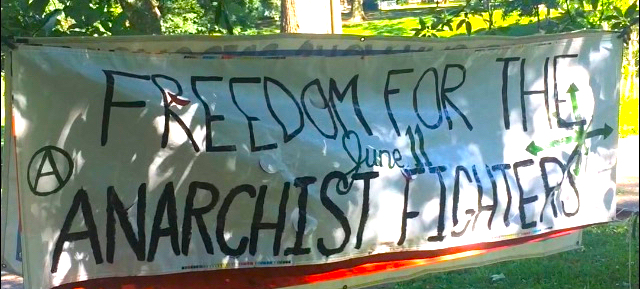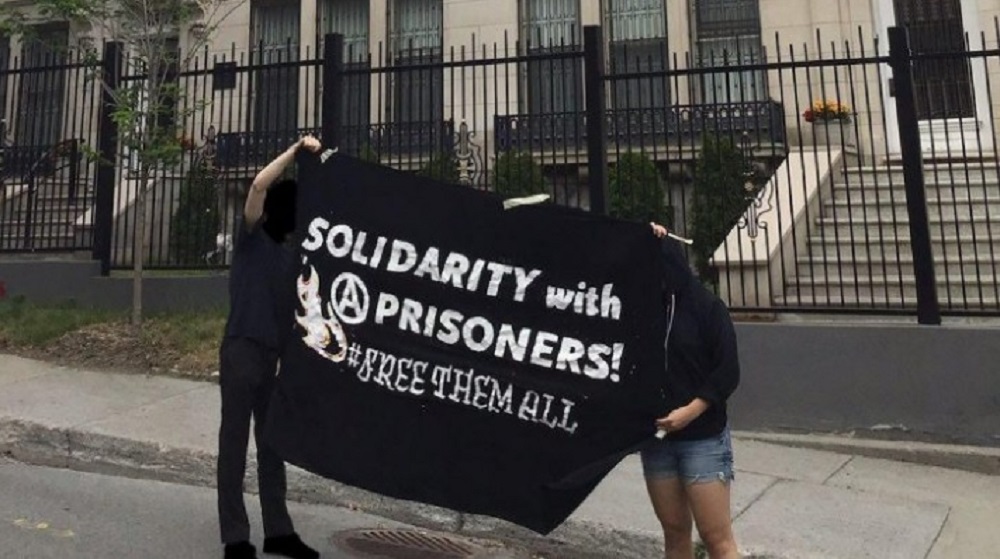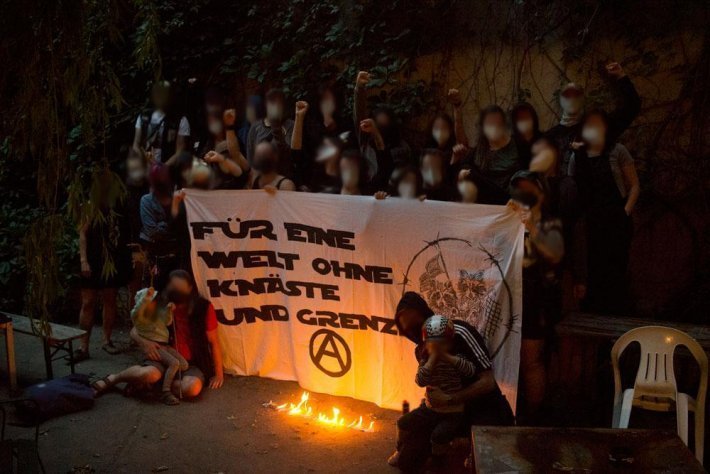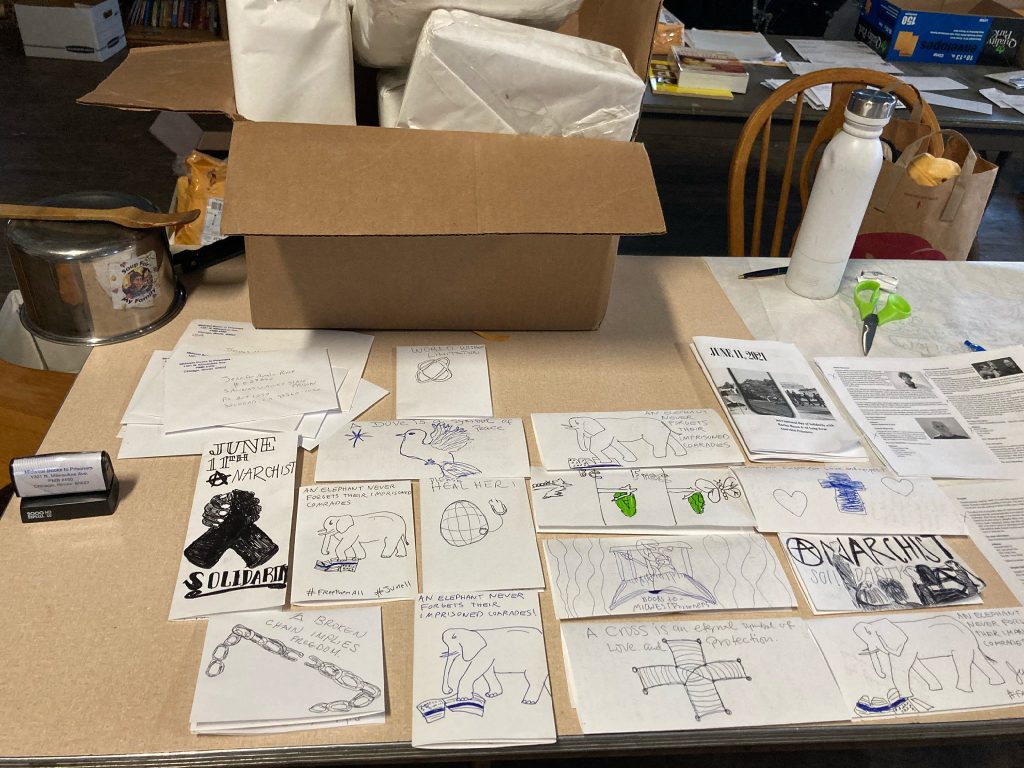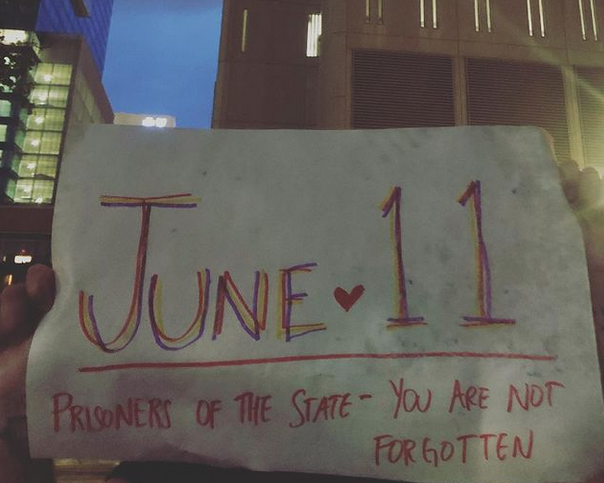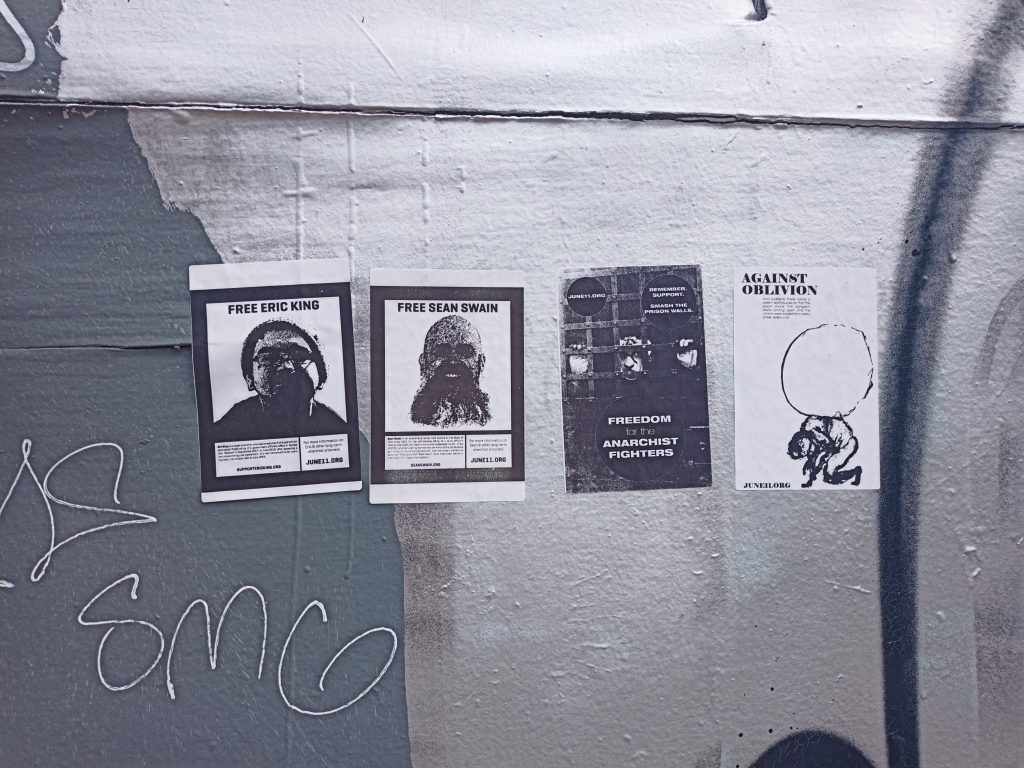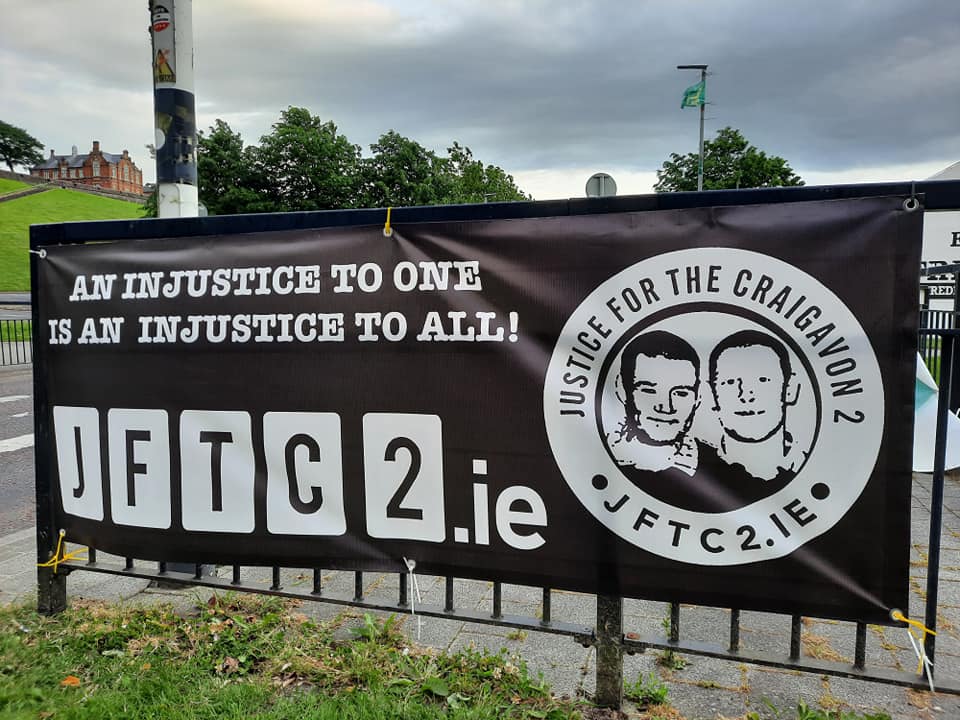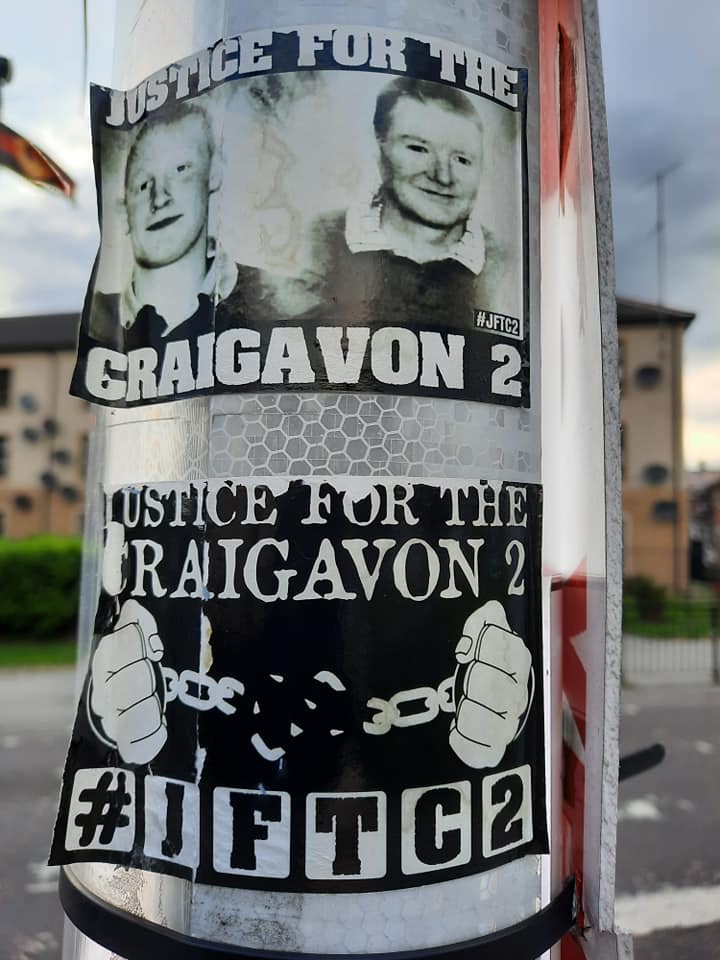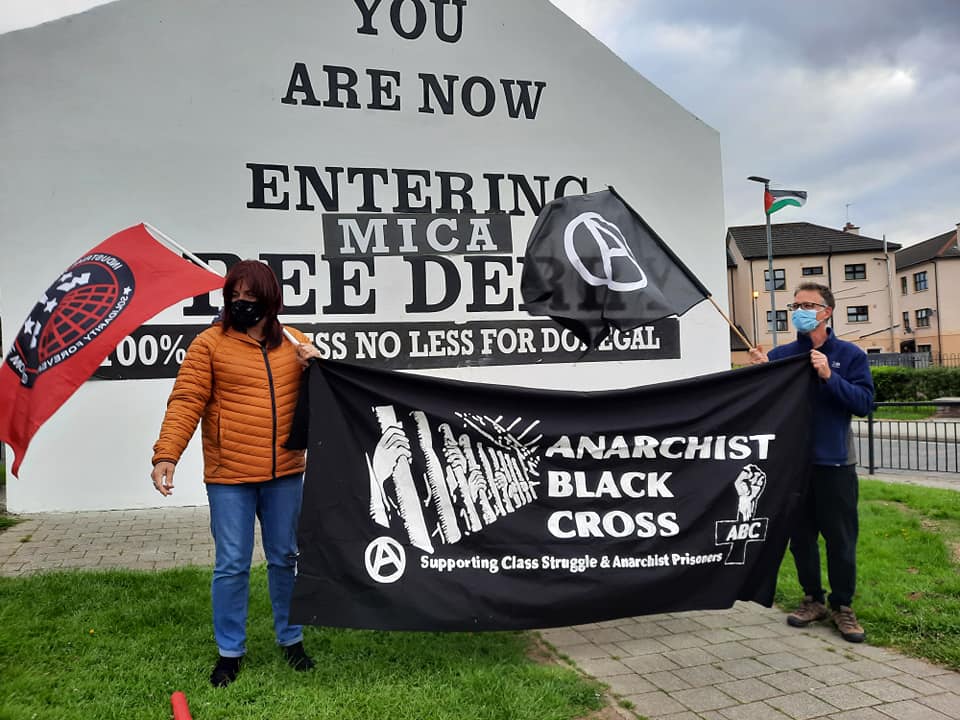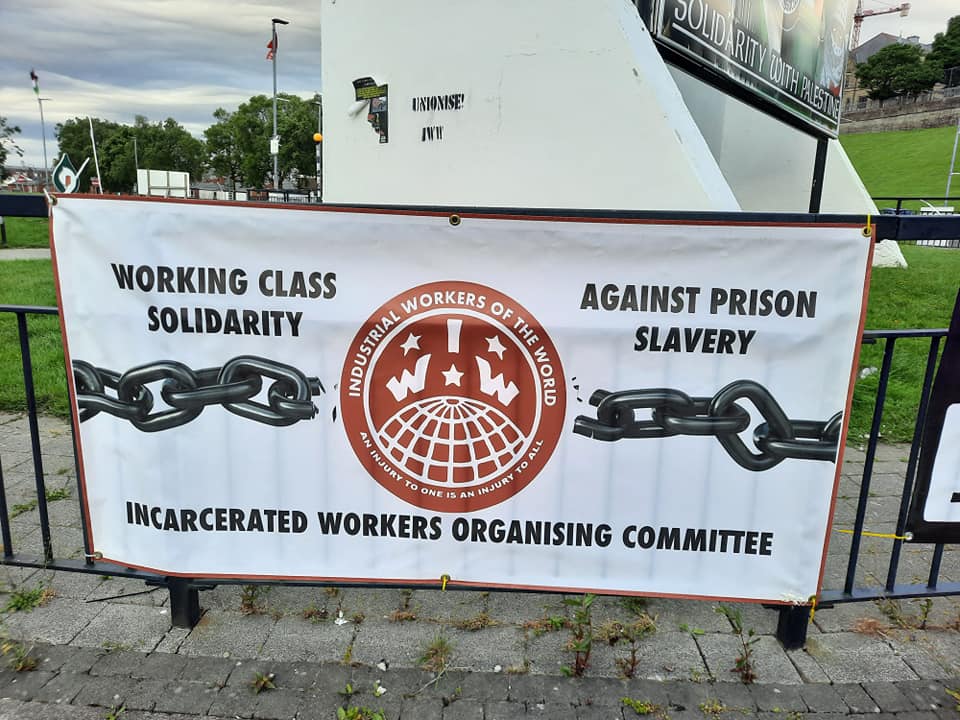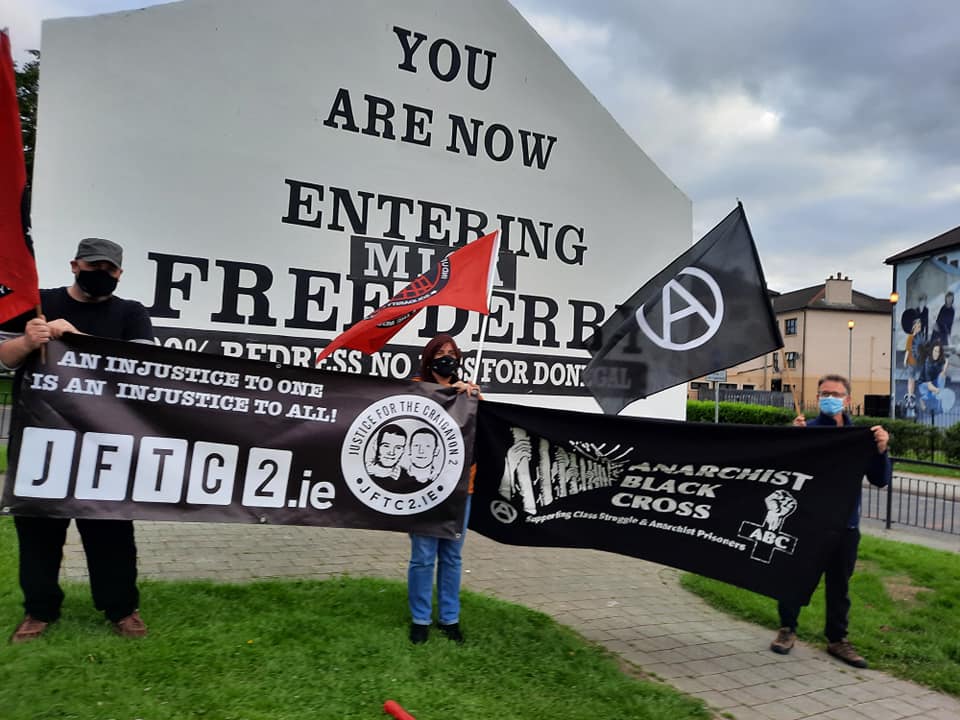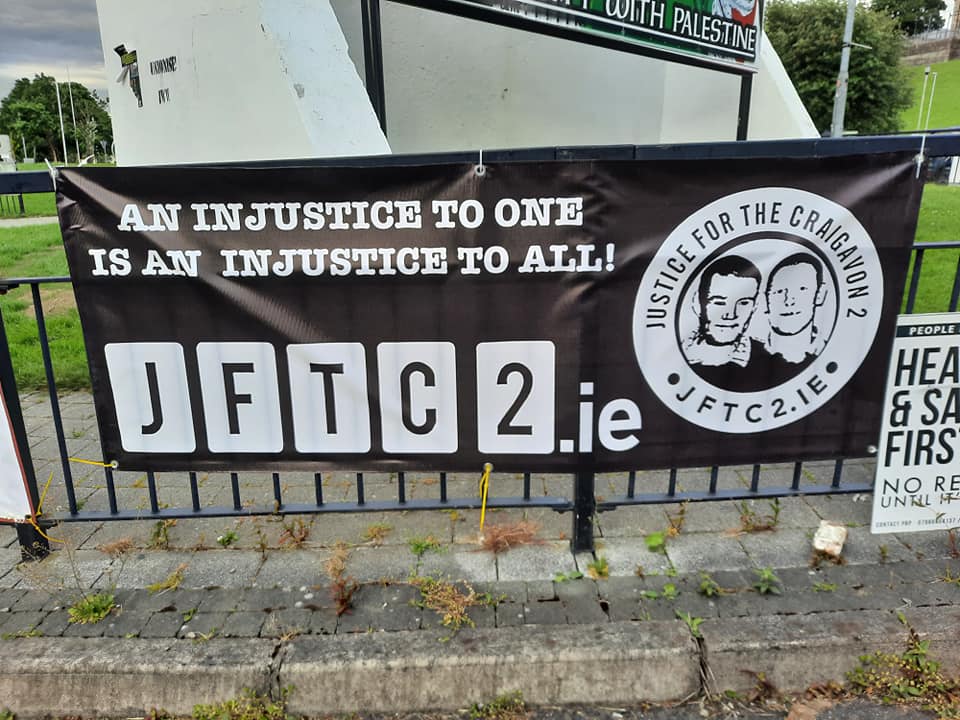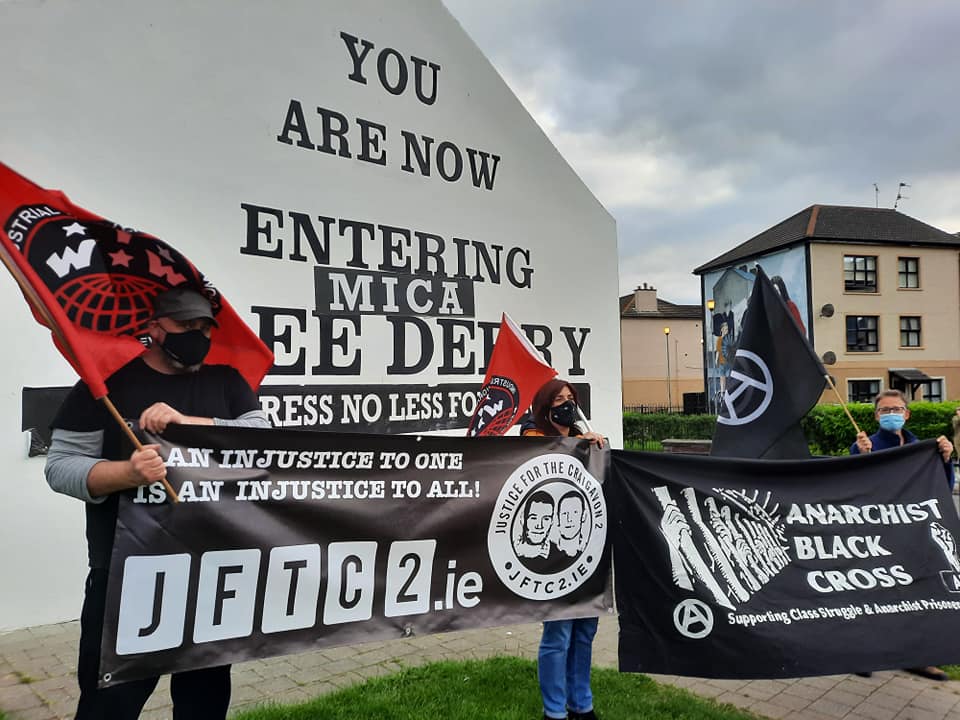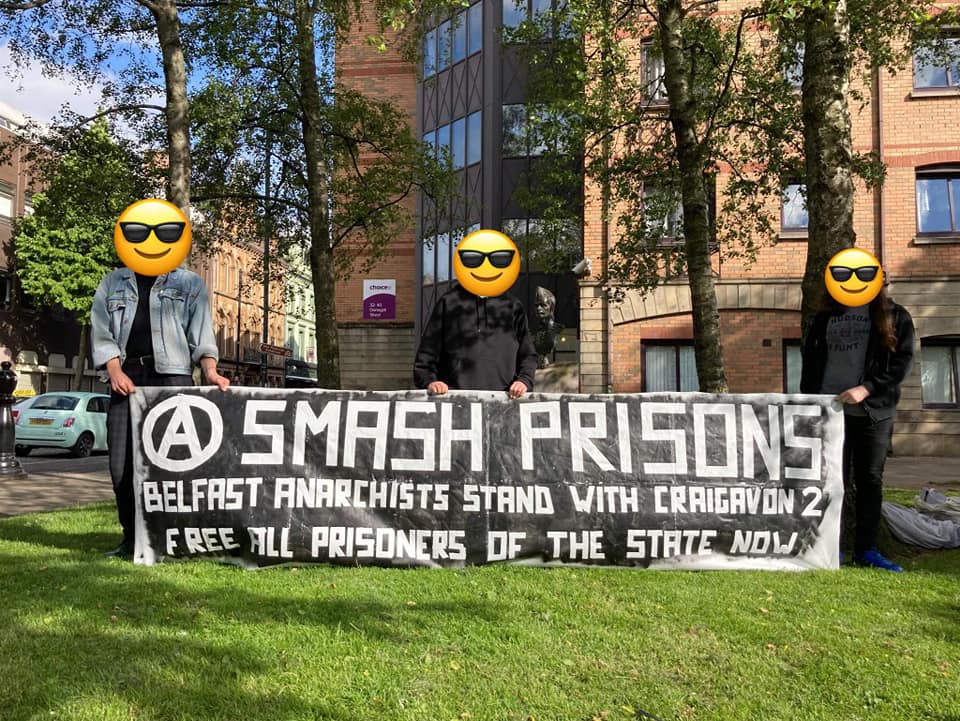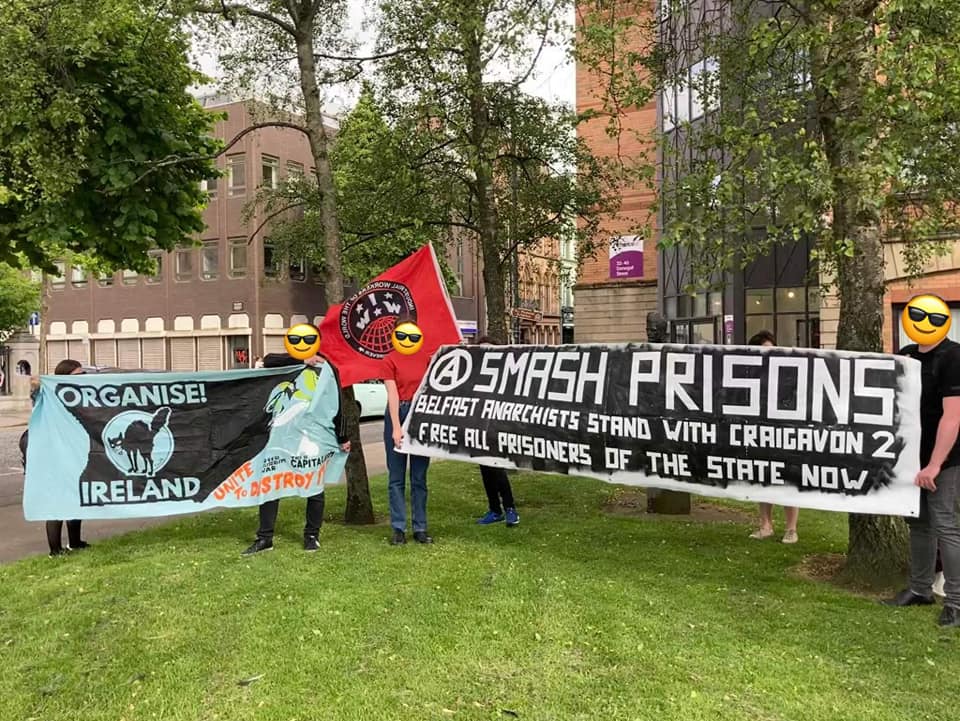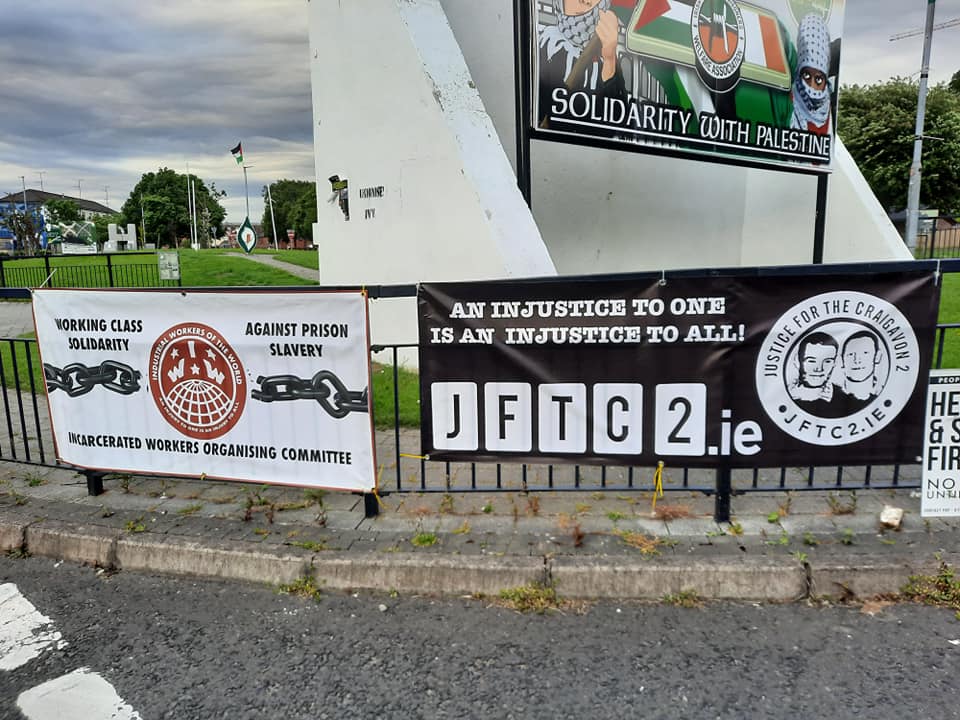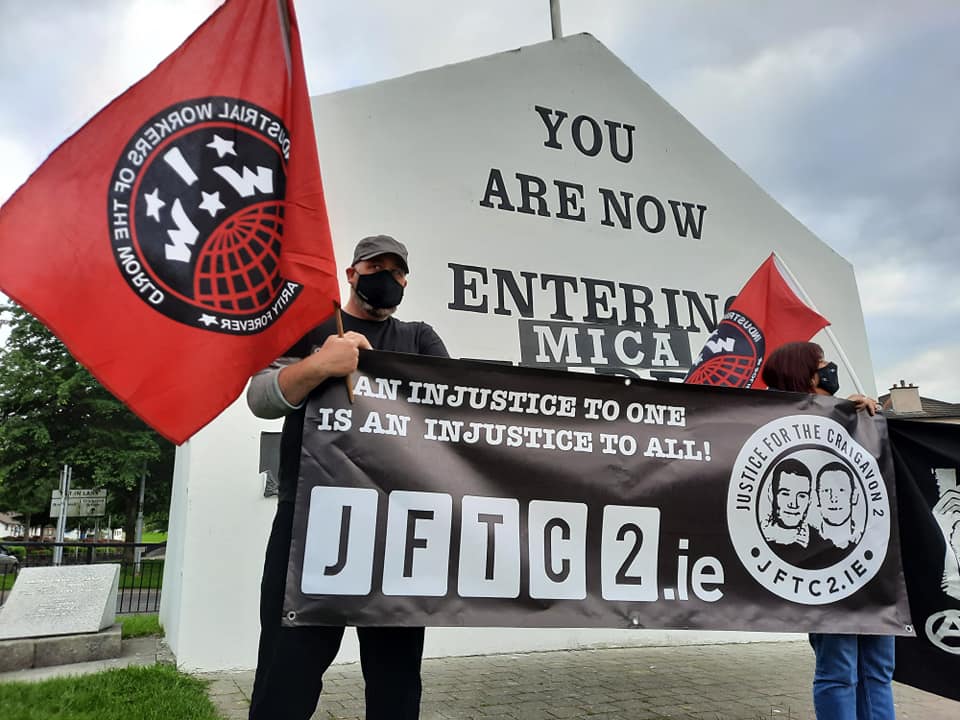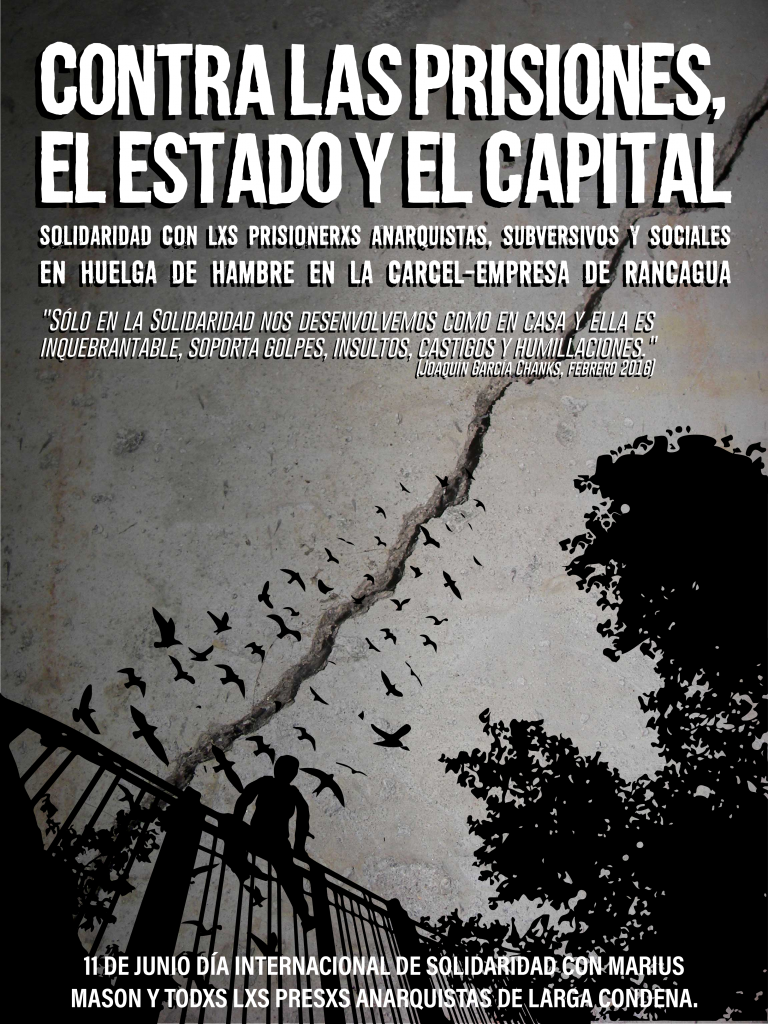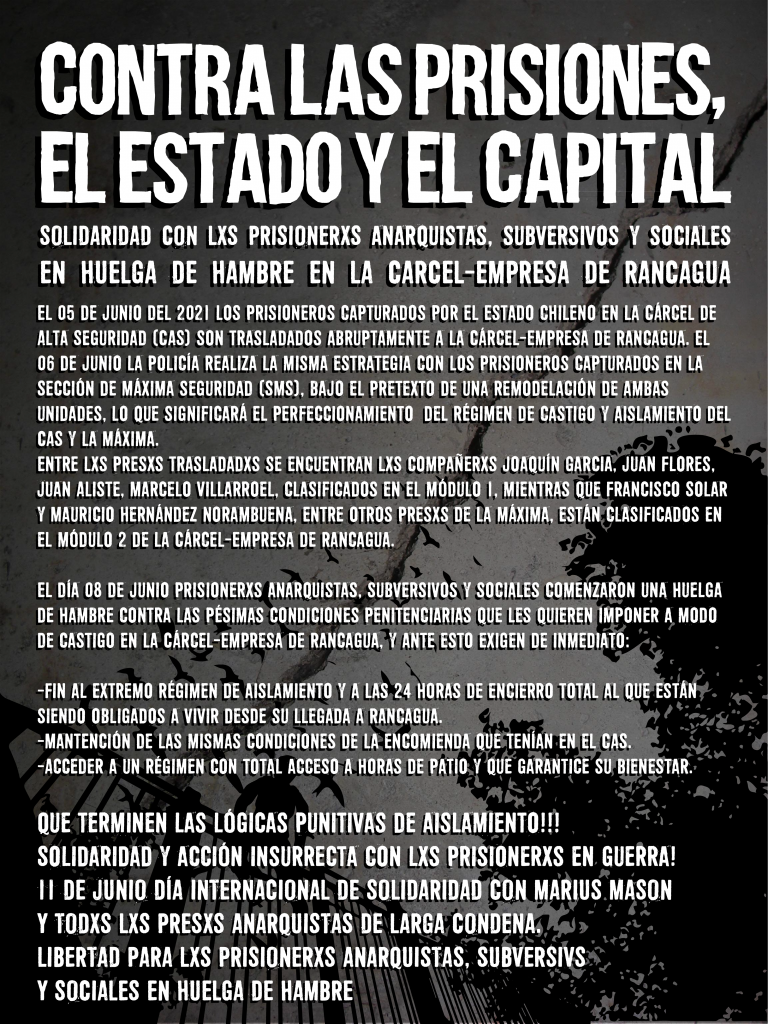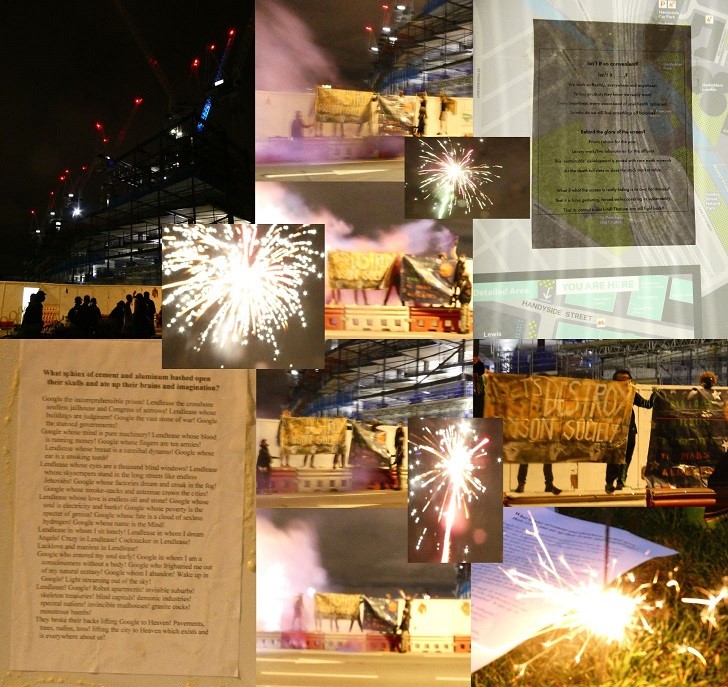Below is a letter from anarchist prisoner Giannis Dimitrakis, in both Greek and English. Back in May he was attacked at Domokos prison and hospitalized. There is currently a fundraiser for him through Firefund.
Hello comrades,
I am very happy that my voice and my thoughts cross the Atlantic and reach you, through a free and self-organized radio station, as it was very difficult for us to communicate closely. Imprisonment, the “dirty” political and criminal records, the enlistment in the anarchist movement certainly make it almost impossible for me to officially enter the United States with permission and documents from the American Embassy in Greece.
Today, however, on the occasion of the International Day of Solidarity with Anarchists Prisoners is an opportunity to travel and meet, beyond borders and restrictions, common values and ideals, similar paths and experiences of people, who lift the heavy burden of responsibility to reverse the self-destructive course of state and capital for humanity, nature and animals.
It is another moment in the relentless fight against oblivion for all the fighters who pay the price of their choice to use any form of social anti-violence to resist or attack to the absurdity, vulgarity, injustice and oppression of the modern exploitative system.
Having already lived 42 years of my life now, I am now talking to you on a telephone from the wing of a provincial prison located about 250 kilometers from Athens, where I come from. 24 years after my first reading of the book “God and State” by M. Bakunin, I remain incurably enchanted by the ideas of anti-authoritarian communism, anarchy.
Constantly following my desire all these years, to fight the seemingly powerful of this land in every way and means, I collectively refuted my denials through joint actions with comrades of the anarchist movement in Greece, where with our own political proposals we dived into big pot of mass social-economic-political struggles.
This is the second time I am trapped behind the walls of a prison as Ι was arrested together with comrade Kostas Sakkas, 2 years ago, by a counter-terrorism unit that was watching at that time every move we made , unfortunately without us realizing it, just a few seconds after we had removed with the threat of weapons from private security officers of the company Group4S the money that they placed in an ATM bank at the entrance of a hospital in Thessaloniki.
Of course, it was no coincidence that we were in a narrow circle by special police ranks. I, almost seven years after my release from prison, remained the target of the cops as a former prisoner and politically active within the lines of the anarchist movement. Costas, just a few months ago, had been released from a four-year detention for possession of weapons and explosives, having previously been acquitted of a series of crimes as he had initially been accused of being a member of the revolutionary organization Conspiracy of Cells of Fire.
For first time, i was imprisoned for six years, in January 2006, when I tried with three other people to expropriate money from a branch of the National Bank in the center of Athens, ending in my arrest and my serious injury from cop’s gunshots after a clash during our escape. On the occasion of this event, three anarchist comrades, Simos Seisidis, Marios Seisidis and Grigoris Tsironis, went underground, when they were considered perpetrators of the robbery by the prosecuting authorities and were issued against them arrest warrants.
Five years later that day, Simos was arrested after being shot in the back by a police officer during a chase that followed his accidental localization and cost him the amputation of his right leg. He was then acquitted of all charges, like Grigoris, who will be arrested in 2015, and are now both free.
Marios was caught in 2016 and currently remains in prison for four years with a long sentence and is awaiting trial in the second degree. At that time I had defended my act with a public text but also in the trials, including the bank robbery as another expression of practical denial of wage labor, as my own answer as an anarchist to the dilemma posed by the capitalist and authoritarian grid, exploiter or exploiting.
Last September, the judges who sentenced me to 11.5 years for a robbery, who played the role of a guinea pig in a police “laboratory”, determined from the beginning to fail in the well-established ambush of the cops, I spoke of my instinctive reaction to resist to the economic, psychological collapse that led me mathematically to the years, uninterrupted and serious conflicts with the repressive mechanism of the state.
After, during the seven-year and difficult effort to avoid a new imprisonment and at the same time to heal the wounds of the six-year confinement that had opened in my family-friendly environment, I realized that the rival camp’s vengeance continued to linger on many levels, suffocatingly narrowing the boundaries of my living space in society outside the walls.
Returning to today, a day of remembrance and solidarity, I must say that the warm embrace of protection that the support of my comrades generously offered me all these 15 years, from 2006 onwards, is the one that has kept me and keeps my mind and my soul intact and unharmed from the days with the monster of confinement, state violence, the justice of bourgeois false-democracy and as many others try to harm me.
Here, in Greece, we often write on the walls of the city, on our banners and in our texts a phrase: “SOLIDARITY IS OUR WEAPON” and really what a great truth it contains!
When the domestic anti-authoritarian / anarchist movement flourished and grew rapidly, going through an explosive decade that passed through the flames of December 2008, thousands of arson and bomb attacks on state and capitalist targets were carried out by many of them to the incarcerated comrades, the anti-memorandum clashes in Syntagma Square in the period 2010-2012, was the solidarity that spread, strengthened the political-comradely relations and formed the necessary counterweight to the Greek state that had overcome its initial his anti-anarchist strategy by imprisoning dozens of anarchists.
It was what took root and pushed and pushes many to risk even their own freedom or life, in order to transform the theory into practice, jumping into the fire of the struggle. And it was only natural that the repressive mechanisms should make the breaking of these strong bonds of solidarity as a top priority successive persecutions, imprisonments and severe convictions, but they have not succeeded.
During this condensed period, during which the spread of anarchist ideas and actions enlarged and thickened the lines of the movement, while at the same time beloved comrades passed through the prison doors at an increasing rate, a quality connection of inside and outside the walls was achieved. On the one hand, the relentless attitude of the prisoners-now-anarchists, who continue to speak, write, defend their actions through the prison cells, to participate in common struggles with the wider population of social prisoners, gave inspiration to those outside the walls to create that solidarity network that will pierce the walls and in practice say nothing is over, everything goes on.
Ethical, political support for the captive anarchists framed by calls for telephone interventions at events, for the publication of interviews and their texts on film and radio, by the sending of books, letters, posters, publications and of course by hundreds of acts of aggression, against various targets as the minimum cost to be paid by those who have a share of responsibility for the hostage-taking of comrades in prison.
In this movement was born the idea of the Solidarity Fund for imprisoned, Persecuted and Revolutionaries which undertook the monthly financial support, initially of the imprisoned anarchists, further expanding the concept of solidarity. In fact, in the following years, as far as possible, the support of the Fund opened its framework and included communist political prisoners and social prisoners with militant activity inside the prisons or who had practically stood in solidarity with persecuted anarchists.
Under this protective umbrella stood those of us who were or are still imprisoned, avoiding a lonely and destructive course in the toxic and corrosive rain that soaks the dark and carnivorous cells, trying – depending on the forces – both inside and outside walls to give feedback to each other.
It was this experientially impressed sense of the value of solidarity that in mid-January prompted me and comrade Nikos Maziotis – a member of the anarchist armed organization Revolutionary Struggle – to launch a hunger strike, supporting effectively the struggle that Dimitris Koufontinas had already begun as a hunger striker. Imprisoned since 2002, taking responsibility for the activities of the armed communist organization 17 November he pledged his life and demanded the implementation of the law passed by the government and illegally by passed it, in order to transfer him to a different prison than planned.
It was impossible to remain inactive in front of the spectacle of the violent abduction from the wing of the emaciated and physically weak fighter by hooded cops, which unfolded before our eyes. A disgusting image that Nikos and I had the “luck” to see as this provincial prison with the highest security standards, intended in the near future to be upgraded to special conditions hell for political prisoners and serious crimes cases, brought us all three in the same wing and in adjacent cells. Also, unfortunately, on the next wing are the recently condemned fascist garbage of the Golden Dawn.
With Dimitris Koufontinas as the protagonist, we attempted to enrich the concept of solidarity with Nikos with our spontaneous reaction and the immediate action of two other fellow prisoners, Polykarpos Georgiadis and Vangelis Stathopoulou, who were held in another prison and connected with the wider radical movement outside the walls, which swept bans and lockdowns due to the pandemic and stubbornly and patiently took thousands of fighters to the streets of the country’s major cities.
The mass demonstrations, the hundreds of night and dynamic actions that took place against banks, political offices of the government and its deputies, vehicles of the cops, etc. in the empty and mined web of cops and patrols was the result of the quality feedback produced by the joint struggle to justify the request of Dimitris Koufontinas.
The end of this conflict, which lasted almost two months, did not have the desired result. But I believe that this resurgence, the rebirth of the social militant forces that developed and defied the military-occupied cities by hordes of enraged cops, who chased and beat anyone who took part in public solidarity movements, far exceeds its values.
The government’s victory was met with heavy losses for itself, as the persistent refusal to a transfer request that led the hunger striker to the brink of death condensed all the sadistic, cold and inhuman nature of the state power that annoyed, awakened, and outraged of society. Let them keep Dimitris in this prison, as we reconstruct, on the basis of the new and quality fomentations that were achieved, the thread for the next games! Prison is the most sharpened weapon of state power and capital to keep the oppressed in the regime of exploitation and freedom imposed on them in order to perpetually reproduce wealth and privileges for a few and some of their courtiers. He is the executioner who awaits both the lower social classes who suffer from misery and the militants who actually challenge the rule of bourgeois false-democracy.
It is the Damocles sword that hangs over the oppressed society and cuts through each individual the collective expression of the anger that accumulates from the violence, the injustice that it receives daily from the exploitative system.
After several centuries, when humanity has replaced torture, mutilation, hangings, guillotines and other harsh ways of punishing lawbreakers with imprisonment and deprivation of liberty, it is certain that this method is a failure. It has accomplished nothing more than reproducing, inflating, and recycling violence with fuel material crushed and disintegrated human souls.
In countries of savage capitalism that apply even stricter conditions of detention for prisoners, not only have they failed to solve the problems posed by the capitalist for-profit and cannibalistic arenas they have set up as a social condition but on the contrary have led to general ossification.
For me, the critique of the anarchists towards the institution of the prison is absolutely apt, which through analyzes ends up abolishing them. Surely the “penitentiary” abortions, the inhuman hells, the concrete storehouses of souls must be destroyed. However, we, who propose the end of deprivation of liberty as a method of administering justice for damages and harmful behavior of some towards others, should propose the new ways of applying justice of the people.
The invocation of a future revolution which, from the next day of its domination, will purify all the mental and psychic distortions of human behavior, will eliminate all the causes that push the individual into cannibalistic practices, and will announce the new sanctified society can go hand in hand with the dreams and desires that motivate us to fight and fight under the ideals of anarchist communism are not enough.
In the fertilization of the revolutionary womb, should not we, as anarchists, have our own seeds, so that if they find fertile ground, that is, the acceptance by large sections of society, the ideas we have for the future world can be developed and tested? Should we not be aware of the experiments and institutions applied by previous revolutionary societies in their attempt to re-approach the concept of justice, so that on the errors or exaggerations that have arisen we may elaborate and imagine, albeit sperm, the new paths that may lead to fairer and freer living conditions?
Our struggle may or may not have many pieces to complete the puzzle, and the image of the revolution. Comrades, have no doubt if this earth, if this paradise that is being transformed into hell hopes to be saved, then the solution belongs to the road that leads to Revolution Avenue. And because the opposite side, at least for the time being, does not seem to give up its privileges, power and wealth voluntarily, it unfortunately remains – as a solution the violent confrontation and overthrow of power and capital.
Without coordination and organization, without the necessary collective substance between ecology, anti-racism, anti-fascism, anti-patriarchy, anti-nationalism, the adoption of sexual preference or any other individual identity, which is nothing more than the rejection of power and capitalism, we will remain which after a while will disappear, passing the disputed to the eternal, in a future whose boundaries are constantly narrowing.
If the revolution comes when the Earth is transformed into a landscape by the movie mad max, then it may be too late and everything, animals, people, natural environment will have paid such a price that victory will have lost its natural and vital space to develop .
In closing, I would like to address in particular the comrades who are struggling in one of the most difficult political environments, such as that of the USA, perhaps the world’s first and most powerful imperialist capitalist locomotive. I can not imagine how difficult it is to speak, think and act in subversive and conflicting ways within a state complex where the death penalty is in place or political prisoners such as members of the Black Panthers are still in prison after many decades.
Observing the level of police violence in the United States in recent years, and not just during the Trump period, our concern was intense, while creating ominous speculation about the future of North Americans and especially the weakest social classes. However, the reactions that erupted on the occasion of the assassination of George Floyd, the months of conflict, the mass demonstrations, the resurgence of social anti-violence as a lever to return the violence accepted by the oppressed, for a long time gave birth to hope again.
My personal joy was great to see that in the cradle of capitalism people took to the streets en masse, multi-racially determined to respond to state violence. I am sure that the fighters who took part in this uprising are now facing the consequences of the repression with arrests, imprisonment and surveillance. I imagine that no one is allowed to attack the “American Dream”, the Success Story that says that in this country everything is possible, meaning that if you bow your head, follow the rules, work like a slave and sell your soul to the strong maybe find a place in the sun.
150 years since the blood-stained Paris Commune and a little less than when in 1886 one of the fighters of the Battle of Chicago and the introduction of the eight o’clock, August Spies said: “exploiters the only argument that can be effective: VIOLENCE! ”
If we as militants / revolutionaries owe a debt to ourselves and then to others then this is to overturn the train of self-destruction led by states and capitalists, to heal the wounds that humanity has opened on nature in animals and to herself and to chart a course for the re-creation of an earthly paradise where life will be the most magical game worth participating in until your last breath.
Today we honor the comrades who endured, endure with dignity, who did not capitulate, did not kneel before the prison monster, the heavy and destructive sentences imposed on them by the rulers of this world.
Until the victory, nothing is over, everything continues.
Good strength to all inside and outside the walls.
Solidarity is our weapon
Giannis Dimitrakis from Domokos prison.
______
Γειά σας σύντροφοι και συντρόφισσες,
είμαι ιδιαίτερα χαρούμενος που η φωνή και οι σκέψεις μου περνούν τον Ατλαντικό και φτάνουν σε σας,μέσω ενός ελευθεριακού και αυτοοργανωμένου ραδιοφωνικού σταθμού,καθώς πολύ δύσκολα θα μπορούσαμε να επικοινωνήσουμε εκ του σύνεγγης. Οι φυλακίσεις,τα “λερωμένα”πολιτικά και ποινικά μητρώα,η στράτευση στο αναρχικό κίνημα σίγουρα κάνουν σχεδόν αδύνατη την επίσημη είσοδο μου στις ΗΠΑ με άδεια και έγγραφα από την Αμερικάνικη Πρεσβεία στην Ελλάδα.
Σήμερα όμως,με αφορμή τη διεθνή μέρα αλληλεγγύης στους/στις φυλακισμένους/ες
αναρχικούς/ες είναι ευκαιρία να ταξιδέψουν και να συναντηθούν,πέρα από σύνορα και περιορισμούς,κοινές αξίες και ιδανικά,παρόμοιες διαδρομές και βιώματα ανθρώπων,που σηκώνουν το βαρύ φορτίο της ευθύνης να αντιστρέψουν την αυτοκαταστροφική πορεία που χαράζουν κράτος και κεφάλαιο για την ανθρωπότητα,τη φύση και τα ζώα.
Είναι μια ακόμα στιγμή στην αδιάκοπη μάχη ενάντια στη λήθη για όλους και όλες τους/τις αγωνιστές/τριες,που πληρώνουν στα σωφρονιστικά κολαστήρια αυτού του κόσμου,το τίμημα της επιλογής τους να χρησιμοποιήσουν οποιαδήποτε μορφή κοινωνικής αντι-βίας,ώστε να αντισταθούν ή να επιτεθούν στον παραλογισμό,τη χυδαιότητα,την αδικία και καταπίεση του σύγχρονου εκμεταλλευτικού συστήματος.
Έχοντας ήδη διαβεί 42 χρόνια της ζωής μου τώρα, τώρα σας μιλάω από ένα τηλέφωνο της πτέρυγας μιας επαρχιακής φυλακής που βρίσκεται σε απόσταση περίπου 250 χιλιόμετρα από την Αθήνα, από όπου κατάγομαι. 24 χρόνια μετά την πρώτη μου ανάγνωση του βιβλίου “Θεός και Κράτος” του Μ.Μπακούνιν, παραμένω αθεράπευτα μαγεμένος από τις ιδέες του αντιεξουσιαστικού κομμουνισμού, της αναρχίας.
Ακολουθώντας συνεχώς την επιθυμία μου όλα αυτά τα χρόνια, να πολεμήσω τους φαινομενικά ισχυρούς αυτής της γης με κάθε τρόπο και μέσο, συλλογικοποίησα τις αρνήσεις μου μέσω κοινών δράσεων με συντρόφους/ισσες του αναρχικού κινήματος στην Ελλάδα, πού με τα δικά μας πολιτικά προτάγματα βουτήξαμε στη μεγάλη χύτρα των μαζικών κοινωνικών- οικονομικών -πολιτικών αγώνων.
Είναι η δεύτερη φορά πού βρίσκομαι έγκλειστος πίσω από τα τείχη μιας φυλακής καθώς συνελήφθη μαζί με το σύντροφο Κώστα Σακκά, πριν από 2 χρόνια, από κλιμάκιο της αντιτρομοκρατικής που παρακολουθούσε κάθε μας κίνηση εκείνη την περίοδο, δυστυχώς χωρίς να το έχουμε αντιληφθεί, μόλις λίγα δευτερόλεπτα αφότου είχαμε αφαιρέσει με την απειλή όπλων από ιδιωτικούς υπαλλήλους security της εταιρείας Group4S τα χρήματα που τοποθετούσαν σε ΑTM τράπεζας στην είσοδο ενός νοσοκομείου της Θεσσαλονίκης.
Φυσικά δεν ήταν τυχαίο το γεγονός ότι βρισκόμασταν σε στενό κλοιό από τα ειδικά κλιμάκια της αστυνομίας.Εγώ,σχεδόν εφτά χρόνια μετά την αποφυλάκιση μου,παρέμενα στο στόχαστρο των μπάτσων ως πρώην κρατούμενος και ενεργός πολιτικά μέσα από τις γραμμές του αναρχικού κινήματος.Ενώ κι ο Κώστας,μόλις πριν λίγους μήνες είχε απελευθερωθεί από μια τετραετή κράτηση για κατοχή όπλων και εκρηκτικών,αφού προηγουμένως είχε αθωωθεί από σωρεία κακουργημάτων καθώς είχε,αρχικά,κατηγορηθεί ως μέλος της ΣΠΦ.
Την πρώτη φορά φυλακίστηκα για έξι χρόνια, όταν τον Γενάρη του 2006 επιχείρησα με άλλα τρία άτομα να απαλλοτριώσω τα χρήματα ενός υποκαταστήματος της εθνικής τράπεζας στο κέντρο της Αθήνας, με κατάληξη τη σύλληψη και το βαρύτατο τραυματισμό μου από πυρά μπάτσων μετά από συμπλοκή κατά τη διαφυγή. Με αφορμή αυτό το γεγονός τρεις αναρχικοί σύντροφοι ο Σίμος Σεϊσίδης, ο Μάριος Σεϊσίδης και ο Γρηγόρης Τσιρώνης πέρασαν σε καθεστώς φυγοδικίας, όταν θεωρήθηκαν από τις διωκτικές αρχές δράστες της ληστείας και εκδόθηκαν εναντίον τους τα αντίστοιχα εντάλματα σύλληψης.
Πέντε χρόνια μετά από εκείνη τη μέρα συνελήφθη ο Σίμος μετά από πισώπλατο πυροβολισμό από μπάτσο κατά τη διάρκεια πεζής καταδίωξης που ακολούθησε τον τυχαίο εντοπισμό του και του κόστισε τον ακρωτηριασμό του δεξιού του ποδιού. Στη συνέχεια θα αθωωθεί από όλες τις κατηγορίες, όπως και ο Γρηγόρης, ο οποίος θα συλληφθεί το 2015, και τώρα πια είναι και οι δύο ελεύθεροι.
Ο Μάριος θα πιαστεί τελευταίος το 2016 και αυτή τη στιγμή παραμένει ήδη τέσσερα χρόνια κρατούμενος με μεγάλη ποινή και περιμένει τη δίκη του σε Β’ βαθμό. Τότε είχα υπερασπισθεί την πράξη μου με δημόσιο κείμενο αλλά και στις δίκες, εντάσσοντας τη ληστεία της τράπεζας ως μία ακόμη έκφραση έμπρακτης άρνησης της μισθωτής εργασίας, ως τη δική μου απάντηση ως αναρχικός στο δίλημμα που θέτει το καπιταλιστικό και εξουσιαστικό πλέγμα εκμεταλλευτής η εκμεταλλευόμενος.
Τον προηγούμενο Σεπτέμβριο, στους δικαστές που με καταδίκασαν σε 11,5 χρόνια για μία ληστεία, που έπαιξα το ρόλο του πειραματόζωου σε συνθήκες αστυνομικού “εργαστηρίου”, εξαρχής προσδιορισμένη να αποτύχει από την καλοστημένη ενέδρα των μπάτσων, μίλησα για την ενστικτώδη αντίδραση μου να αντισταθώ στην οικονομική, ψυχολογική κατάρρευση που με οδηγούσαν μαθηματική ακρίβεια οι χρονιές, αδιάκοπες και σοβαρές συγκρούσεις με τους κατασταλτικούς μηχανισμός του κράτους.
Αφού, κατά τη διάρκεια της επτάχρονης και δύσκολης προσπάθειας να αποφύγω μία νέα φυλάκιση και ταυτόχρονα να επουλώσω τις πληγές του εξάχρονου εγκλεισμού που είχαν ανοίξει στο οικογενειακό φιλικό – συντροφικό περιβάλλον, αντιλήφθηκα ότι το μένος και η εκδικητικότητα του αντίπαλου στρατοπέδου εξακολουθούσε με διακυμάνσεις να επιτίθεται εναντίον μου σε πολλά επίπεδα επίπεδα, στενεύοντας ασφυκτικά τα όρια του ζωτικού μου χώρου στην κοινωνία εκτός των τειχών.
Επανερχόμενος λοιπόν στη σημερινή ημέρα, μέρα μνήμης και αλληλεγγύης, πρέπει να πω ότι η ζεστή αγκαλιά προστασίας που απλόχερα μου προσέφερε η υποστήριξη των συντρόφων/ισσων όλα αυτά τα 15 χρόνια, από το 2006 και μετά, είναι και αυτή που με κράτησε και κρατάει το μυαλό μου και την ψυχή μου ακέραια και αλώβητα από τις μέρες με το τέρας του εγκλεισμού, την κρατική βία, τη δικαιοσύνη της αστικής ψευδόδημοκρατίας και όσο άλλων επιχειρούν να με βλάψουν.
Εδώ, στην Ελλάδα, πολλές φορές γράφουμε στους τοίχους της πόλης, στα πανό και στα κείμενα μας μία φράση: “Η ΑΛΛΗΛΕΓΓΥΗ ΕΙΝΑΙ ΤΟ ΟΠΛΟ ΜΑΣ” και πραγματικά πόσο μεγάλη αλήθεια εμπεριέχει!
Όταν το εγχώριο αντιεξουσιαστικό/αναρχικό κίνημα άνθιζε και αναπτυσσόταν με γοργούς ρυθμούς , διανύοντας μία εκρηκτική δεκαετία που πέρασε μέσα από τις φλόγες του Δεκέμβρη του 2008, τις χιλιάδες εμπρηστικές και βομβιστικές επιθέσεις σε κρατικούς και καπιταλιστικούς στόχους με πολλές από αυτές τις ενέργειες να αφιερώνονται στους/στις έγκλειστους/ες συντρόφους/ισσες , τις αντιμνημονιακές συγκρούσεις της πλατείας Συντάγματος την περίοδο 2010-2012, ήταν η αλληλεγγύη που απλώθηκε, δυνάμωσε τις πολιτικές-συντροφικές σχέσεις και σχημάτισε το απαραίτητο αντίβαρο απέναντι στο ελληνικό κράτος που έχοντας ξεπεράσει τον αρχικό αιφνιδιασμό του ξεδίπλωσε την αντι-αναρχική στρατηγική του φυλακίζοντας δεκάδες αναρχικούς/ές.
Ήταν αυτό που ρίζωσε και ώθησε και ωθεί πολλούς/ές να ρισκάρουν ακόμα και την ίδια τους την ελευθερία ή τη ζωή τους, προκειμένου να μετουσιώσουν τη θεωρία σε πράξη, πηδώντας μέσα στη φωτιά του αγώνα. Και ήταν φυσικό επόμενο οι κατασταλτικοί μηχανισμοί να θέσουν ως κύρια προτεραιότητα το σπάσιμο αυτών των ισχυρών δεσμών αλληλεγγύης αλλεπάλληλες διώξεις, φυλακίσεις και βαριές καταδίκες, χωρίς όμως να το έχουν καταφέρει.
Μέσα σε αυτήν συμπυκνωμένη περίοδο, κατά την οποία η εξάπλωση των αναρχικών ιδεών και δράσεων μεγενθύθηκε και πύκνωσε τις γραμμές του κινήματος, ενώ ταυτόχρονα αγαπημένοι/ες σύντροφοι/ες περνούσαν με αυξανόμενο ρυθμό τις πόρτες των φυλακών επιτευχθεί μία ποιοτική σύνδεση των εντός και εκτός των τειχών. Από τη μία πλευρά η ανυποχώρητη στάση των αιχμαλώτων-πια-αναρχικών, που συνεχίζουν μέσα από τα κελιά των φυλακών να μιλούν, να γράφουν, να υπερασπίζονται τις πράξεις τους, να συμμετέχουν σε κοινούς αγώνες με τον ευρύτερο πληθυσμό των κοινωνικών κρατουμένων, έδινε την έμπνευση στους εκτός των τειχών να δημιουργήσουν εκείνο το δίκτυο αλληλεγγύης πού θα τρυπήσει τα τείχη και έμπρακτα θα πει τίποτα δεν τελείωσε, όλα συνεχίζονται.
Ηθική, πολιτική στήριξη των αιχμάλωτων αναρχικών που πλαισιώθηκε από προσκλήσεις για τηλεφωνικές παρεμβάσεις σε εκδηλώσεις, για δημοσίευση συνεντεύξεων και κειμένων τους σε κινηματικά έντυπα και ραδιόφωνα, από αποστολή βιβλίων, γραμμάτων, αφισών, εντύπων και φυσικά από εκατοντάδες επιθετικές δράσεις, με κάθε τρόπο και μέσο ενάντια σε διάφορους στόχους ως το ελάχιστο κόστος που θα πληρώνουν όσοι έχουν μερίδιο ευθύνης για την ομηρία των συντρόφων/ισσών στις φυλακές.
Μέσα σε αυτήν την κίνηση γεννήθηκε και η ιδέα του Ταμείου φυλακισμένων και διωκόμενων Αγωνιστών που ανέλαβε τη μηνιαία οικονομική στήριξη, αρχικά των έγκλειστων αναρχικών, πλαταίνοντας ακόμα πιο πολύ την έννοια της αλληλεγγύης. Μάλιστα, τα επόμενα χρόνια, στο μέτρο του εφικτού η στήριξη του Ταμείου άνοιξε τα πλαίσια της και συμπεριέλαβε κομμουνιστές πολιτικούς κρατούμενους και κοινωνικούς κρατούμενους με αγωνιστική δραστηριότητα εντός των φυλακών ή που είχαν σταθεί έμπρακτα ως αλληλέγγυοι σε διωκόμενους αναρχικούς.
Κάτω από αυτήν την προστατευτική ομπρέλα σταθήκαμε όσοι βρεθήκαμε ή βρισκόμαστε ακόμα έγκλειστοι στις φυλακές, αποφεύγοντας μία μοναχική και καταστροφική πορεία μέσα στην τοξική και διαβρωτική βροχή που μουσκεύει τα σκοτεινά και σαρκοβόρα κελιά, προσπαθώντας – αναλόγως τις δυνάμεις – τόσο οι εντός όσο και οι εκτός των τειχών να ανατροφοδοτεί ο ένας τον άλλον.
Ήταν αυτή ή βιωματικά εντυπωμένη αίσθηση της αξίας της αλληλεγγύης που στα μέσα του Γενάρη ώθησε εμένα και τον σύντροφο Νίκο Μαζιώτη – μέλος της αναρχικής ένοπλης οργάνωσης Επαναστατικός Αγώνας – να ξεκινήσουμε απεργία πείνας στηρίζοντας έμπρακτα τον αγώνα που ήδη είχε αρχίσει ως απεργός πεινάς ο Δημήτρης Κουφοντίνας. Κρατούμενος από το 2002, έχοντας αναλάβει την ευθύνη για τη δράση της ένοπλης κομμουνιστικής οργάνωσης 17 Νοέμβρη, έβαλε τη ζωή του ενέχυρο και απαίτησε την εφαρμογή του νόμου που είχε ψηφίσει η κυβέρνηση και παράτυπα παρέκαμψε, ώστε να τον μετάγει σε διαφορετική φυλακή από αυτήν που προβλεπόταν.
Ήταν αδύνατο να παραμείνουμε άπραγοι μπροστά στο θέαμα της βίαιης απαγωγής από την πτέρυγα του αδυνατισμένου και αδύναμου σωματικά αγωνιστή από κουκουλοφόρους μπάτσους,που εκτυλίχθηκε μπροστά στα μάτια μας. Μία αποκρουστική εικόνα που είχαμε, εγώ και ο Νίκος, την “τύχη” να δούμε καθώς αυτή η επαρχιακή φυλακή με προδιαγραφές υψίστης ασφαλείας, προορισμένη στο άμεσο μέλλον να αναβαθμιστεί σε ειδικών συνθηκών κολαστήριο για πολιτικούς κρατούμενους και βαριές περιπτώσεις αδικημάτων, μας έφερε και τους τρεις στην ίδια πτέρυγα και σε διπλανά κελιά. Επίσης, δυστυχώς, στη διπλανή πτέρυγα είναι τα προσφάτως καταδικασμένα φασιστικά σκουπίδια της Χρυσής Αυγής.
Με πρωτεργάτη τον Δημήτρη Κουφοντίνα, τον εμπλουτισμό της έννοιας αλληλεγγύης του επιχειρήσαμε μαζί με τον Νίκο με την αυθόρμητη αντίδραση μας και την άμεση δράση δύο άλλων αιχμαλώτων συντρόφων, του Πολύκαρπου Γεωργιάδη και του Βαγγέλη Σταθοπούλου που κρατούνται σε άλλη φυλακή, εκκινήθηκε μία τεράστια μάχη που επικοινώνησε και συνδέθηκε με το ευρύτερο ριζοσπαστικό κίνημα εκτός των τειχών,που σάρωσε απαγορεύσεις και lockdown εξαιτίας της πανδημίας και με πείσμα και υπομονή έβγαλε χιλιάδες αγωνιστές/ριες στους δρόμους των μεγάλων πόλεων της χώρας.
Οι μαζικές διαδηλώσεις ,οι εκατοντάδες νυχτερινές και δυναμικές ενέργειες που πραγματοποιήθηκαν εναντίον τραπεζών, πολιτικών γραφείων της κυβέρνησης και των βουλευτών της, οχημάτων των μπάτσων κ.α. μέσα στο άδειο και ναρκοθετημένο ιστό από μπάτσους και περιπολικά ήταν αποτέλεσμα της ποιοτικής ανατροφοδότησης που παρήγαγε ο κοινός αγώνας για τη δικαίωση του αιτήματος του Δημήτρη Κουφοντίνα.
Το τέλος αυτής της σύγκρουσης, που κράτησε σχεδόν δύο μήνες, δεν είχε το επιθυμητό αποτέλεσμα. Όμως πιστεύω ότι αυτή η αναζωπύρωση, η αναγέννηση των κοινωνικών αγωνιστικών δυνάμεων που αναπτύχθηκαν και αψήφισαν τις στρατοκρατούμενες πόλεις από ορδές εξαγριωμένων μπάτσων, που κυνηγούσαν και χτυπούσαν οποιονδήποτε συμμετείχε σε δημόσιες κινήσεις αλληλεγγύης, ξεπερνούν κατά πολύ τις έννοιες της νίκης ή της ήττας.
Η νίκη της κυβέρνησης επιβλήθηκε με βαριές απώλειες για την ίδια, αφού η εμμονική άρνηση σε ένα αίτημα μεταγωγής που οδήγησε στα όρια του θανάτου τον απεργό πείνας συμπύκνωσε όλη τη σαδιστική, ψυχρή και απάνθρωπη φύση της κρατικής εξουσίας που ενόχλησε, αφύπνισε, εξόργισε τα προοδευτικά κομμάτια της κοινωνίας. Ας κρατήσουν αυτοί τον Δημήτρη σε αυτήν τη φυλακή, καθώς εμείς άνασυνθέτουμε, στη βάση των νέων και ποιοτικών ζυμώσεων που επιτεύχθηκαν, το νήμα για τους επόμενους αγώνες!
Η φυλακή είναι το πιο καλόακονισμένο όπλο της κρατικής εξουσίας και του κεφαλαίου ώστε να συγκρατεί τις/ τους καταπιεσμένες/ους στο καθεστώς εκμετάλλευσης και ανελευθερίας που τους έχει επιβληθεί με σκοπό την αέναη αναπαραγωγή πλούτου και προνομίων για λίγους και μερικών αυλικών τους. Είναι ο δήμιος που παραμονεύει τόσο τις χαμηλές κοινωνικές τάξεις που υποφέρουν από την ανέχεια, όσο και τους/τις αγωνιστές/ριες που αμφισβητούν έμπρακτα, την κυριαρχία της ψευδοδημοκρατίας των αστών.
Είναι η δαμόκλειος σπάθη που επικρέμεται πάνω από την καταπιεζόμενη κοινωνία και πετσοκόβει κάθε ατομική η συλλογική έκφραση της οργής που συσσωρεύει από τη βία ,την αδικία που δέχεται καθημερινά από το εκμεταλλευτικό σύστημα.
Μετά από το πέρασμα αρκετών αιώνων, όταν και η ανθρωπότητα αντικατέστησε τους βασανισμούς, ακρωτηριασμούς, τις κρεμάλες, τις λαιμητόμους και άλλους σφιχτούς τρόπους επιβολής τιμωρία στους παραβάτες των νόμων, με τη φυλακή και τη στέρηση της ελευθερίας, είναι πια βέβαιο ότι και αυτή η μέθοδος είναι αποτυχημένη. Δεν κατάφερε τίποτα περισσότερο από το να αναπαράγει, διογκώνει και να ανακυκλώνει βία με καύσιμο υλικό τσακισμένες και διαλυμένες ανθρώπινες ψυχές.
Σε χώρες άγριου καπιταλισμού που εφαρμόζουν μάλιστα αυστηρότερες συνθήκες κράτησης για τους φυλακισμένους όχι μόνο δεν κατάφεραν να επιλύσουν τα προβλήματα που δημιουργούν οι καπιταλιστικές κερδοσκοπικές και ανθρωποφαγικές αρένες που έχουν στήσει ως κοινωνική συνθήκη αλλά απεναντίας έχουν οδηγήσει στη γενική αποκτήνωση.
Για μένα είναι απολύτως εύστοχη η κριτική των αναρχικών απέναντι στο θεσμό της φυλακής, η οποία μέσα από αναλύσεις καταλήγει προταγματικά στην κατάργηση τους. Σίγουρα τα “σωφρονιστικά” εκτρώματα, τα απάνθρωπα κολαστήρια, οι τσιμεντένιες αποθήκες ψυχών πρέπει να καταστραφούν. Οφείλουμε όμως εμείς, που προτείνουμε τον τερματισμό της στέρησης της ελευθερίας ως μέθοδο απονομής δικαιοσύνης για επιζήμιες και βλαβερές συμπεριφορές κάποιων έναντι άλλων, να αντιπροτείνουμε τους νέους τρόπους εφαρμογές της λαϊκής δικαιοσύνης.
Η επίκληση μιας μελλοντικής επανάστασης πού, από την επόμενη μέρα της επικράτησης της, θα καθάρει όλες τις νοητικές και ψυχικές στρεβλώσεις της ανθρώπινης συμπεριφοράς, θα εξαφανίσει όλα τα αίτια που ωθούν το άτομο σε κανιβαλιστικές πρακτικές και θα αναγγείλει τη νέα καθαγιασμένη κοινωνία μπορεί να συμβαδίζει με τα όνειρα και τις επιθυμίες που μας παρακινούν να αγωνιζόμαστε και να πολεμάμε κάτω από τα ιδανικά του κομμουνισμού της αναρχίας, δεν αρκεί.
Στη γονιμοποίηση της επαναστατικής μήτρας δεν πρέπει να έχουμε και εμείς ως αναρχικοί τους δικούς μας σπόρους, ώστε αν βρουν εύφορο έδαφος, δηλαδή την αποδοχή από μεγάλα κομμάτια της κοινωνίας να αναπτυχθούν και να δοκιμαστούν οι ιδέες που έχουμε για το μελλοντικό κόσμο; Άραγε δεν πρέπει να έχουμε γνώση των πειραματισμών και των θεσμών που εφάρμοσαν προηγούμενες επαναστατημένες κοινωνίες στην προσπάθειά τους να επαναπροσεγγίσουν την έννοια της δικαιοσύνης, ώστε πάνω στα λάθη ή τις υπερβολές που εμφανίστηκαν να επεξεργαστούμε και να φανταστούμε, έστω και σπερματικά, τις νέες διαδρομές που πιθανόν να οδηγήσουν σε πιο δίκαιες και ελεύθερες συνθήκες ζωής;
Ο αγώνας μας ίσως να έχει ίσως και να μην έχει πολλά κομμάτια για να ολοκληρωθεί το παζλ, και η εικόνα της επανάστασης.Σύντροφοι/ισσες μην έχετε καμία αμφιβολία αν αυτή η γη, αν αυτός ο παράδεισος που μεταμορφώνεται σε κόλαση έχει ελπίδα να διασωθεί, τότε η λύση ανήκει στο δρόμο που οδηγεί στη λεωφόρο της Επανάστασης. Και επειδή η απέναντι πλευρά ,τουλάχιστον προς το παρόν, δε φαίνεται ότι θα αφήσει τα προνόμια, την ισχύ και τον πλούτο της εθελοντικά, παραμένει δυστυχώς -ως λύση η βίαιη αντιμετώπιση και ανατροπή της εξουσίας και του κεφαλαίου.
Χωρίς συντονισμό και οργάνωση, χωρίς την απαραίτητη συλλογική ουσία μεταξύ οικολογίας, αντιρατσισμού, αντιφασισμού, αντίπατριαρχισμού, αντιεθνικισμού, υιοθέτησης σεξουαλικής προτίμησης ή άλλης επιμέρους ατομικής ταυτότητας, που δεν είναι άλλη από την απόρριψη της εξουσίας και του καπιταλισμού, θα παραμείνουμε τροχιοδηκτικές βολές στο σκοτεινό ουρανό, που μετά από λίγο θα σβήνουν, μετακυλίοντας το επίδικο στο διηνεκές, σε ένα μέλλον που συνεχώς τα όρια του στενεύουν.
Αν η επανάσταση έρθει όταν η Γη μεταμορφωθεί σε τοπίο από την ταινία mad max, τότε ίσως να είναι πολύ αργά και όλα, ζώα, άνθρωποι, φυσικό περιβάλλον θα έχουν πληρώσει τέτοιο κόστος που η νίκη θα έχει χάσει το φυσικό και ζωτικό της χώρο να αναπτυχθεί.
Κλείνοντας θέλω να απευθυνθώ ιδιαίτερα στους συντρόφους και στις συντρόφισσες πού αγωνίζονται σε ένα από τα πιο δύσκολα πολιτικά περιβάλλοντα, όπως είναι αυτό των ΗΠΑ ίσως της πρώτης και πιο ισχυρής ιμπεριαλιστικής καπιταλιστικής ατμομηχανής του κόσμου. Δεν μπορώ να φανταστώ πόσο δύσκολο είναι να μιλάς, να σκέφτεσαι και να δρας με ανατρεπτικούς και συγκρουσιακούς τρόπους εντός ενός κρατικού συμπλέγματος, όπου κατά τόπους ισχύει η θανατική ποινή ή πολιτικοί κρατούμενοι όπως μέλη των Μαύρων Πάνθηρων εξακολουθούν μετά από πολλές δεκαετίες να βρίσκονταν στη φυλακή.
Παρατηρώντας τα προηγούμενα χρόνια και όχι μόνο κατά τη διάρκεια της Τραμπικής περιόδου το επίπεδο άσκησης βίας των μπάτσων στις ΗΠΑ, κυρίως απέναντι σε αφροαμερικανούς, η ανησυχία μας ήταν έντονη, ενώ δημιουργούσε δυσοίωνες εικασίες για το μέλλον των Β.Αμερικανών και κυρίως των πιο αδύναμων κοινωνικών τάξεων. Οι αντιδράσεις όμως που ξέσπασαν με αφορμή τη δολοφονία του George Floyd, οι πολύμηνες συγκρούσεις, οι μαζικές διαδηλώσεις, η αναζωπύρωση της κοινωνικής αντιβίας ως μοχλού επιστροφής της βίας που δέχονται οι καταπιεσμένοι, για μεγάλο χρονικό διάστημα γεννήσαν πάλι την ελπίδα.
Η χαρά μου προσωπικά ήταν μεγάλη βλέποντας ότι στο λίκνο του καπιταλισμού οι ανθρώποι μαζικά, πολυφυλετικά κατέβηκαν στους δρόμους αποφασισμένοι να απαντήσουν στην κρατική βία. Είμαι σίγουρος ότι οι αγωνιστές/ριες που συμμετείχαν σε αυτόν τον ξεσηκωμό, τώρα αντιμετωπίζουν τις συνέπειες της καταστολής με συλλήψεις, φυλακίσεις και παρακολουθήσεις. Φαντάζομαι οτι σε κανέναν δεν επιτρέπεται να επιτίθεται στο “Αμερικανικό όνειρο”, στο Success Story που λέει πως σε αυτή τη χώρα είναι όλα δυνατά, εννοώντας ότι αν σκύψεις το κεφάλι, ακολουθήσεις τους κανόνες, δουλέψεις σαν σκλάβος και πουλήσεις την ψυχή σου στους ισχυρούς ίσως βρεις μία θέση στον ήλιο.
150 χρόνια από την αιματοβαμμένη Παρισινή Κομμούνα και λίγα περισσότερα από όταν το 1886 ένας από τους αγωνιστές της μάχης του Σικάγο και την καθιέρωση του οκταώρου, ο Αύγουστος Σπάιζ έλεγε ότι “κάνουμε επείγουσα έκκληση στην τάξη των μισθωτών να εξοπλιστεί και να προβάλλει ενάντια σε όλους τους εκμεταλλευτές της το μοναδικό επιχείρημα που μπορεί να είναι αποτελεσματικό: τη ΒΙΑ!”
Αν έχουμε ως αγωνιστές/ριες επαναστάτες/τριες ένα χρέος απέναντι στον εαυτό μας και μετά προς τους άλλους τότε αυτό είναι να ανατρέψουμε το τρένο της αυτοκαταστροφής που οδηγούν τα κράτη και οι καπιταλιστές,να επουλώσουμε τις πληγές που έχει ανοίξει η ανθρωπότητα πάνω στη φύση στα ζώα και στον ίδιο της τον εαυτό και να χαράξουμε πορεία για την επαναδημιουργία ενός επίγειου παράδεισου όπου η ζωή θα είναι το πιο μαγικό παιχνίδι που θα αξίζει να συμμετέχεις μέχρι την τελευταία σου πνοή.
Τιμούμε σήμερα τους συντρόφους και τις συντρόφισσες που άντεξαν, αντέχουν με αξιοπρέπεια,που δεν συνθηκολόγησαν, δεν γονάτισαν μπροστά στο τέρας της φυλακής, τις βαριές και εξοντωτικές καταδίκες που τους επέβαλαν οι επικυρίαρχοι αυτού του κόσμου.
Μέχρι τη νίκη, τίποτα δεν τελείωσε όλα συνεχίζονται.
Καλή δύναμη σε όλους και όλες, εντός και εκτός των τειχών.
Η αλληλεγγύη είναι το όπλο μας
Γιάννης Δημητράκης από τις φυλακές Δομοκού.

